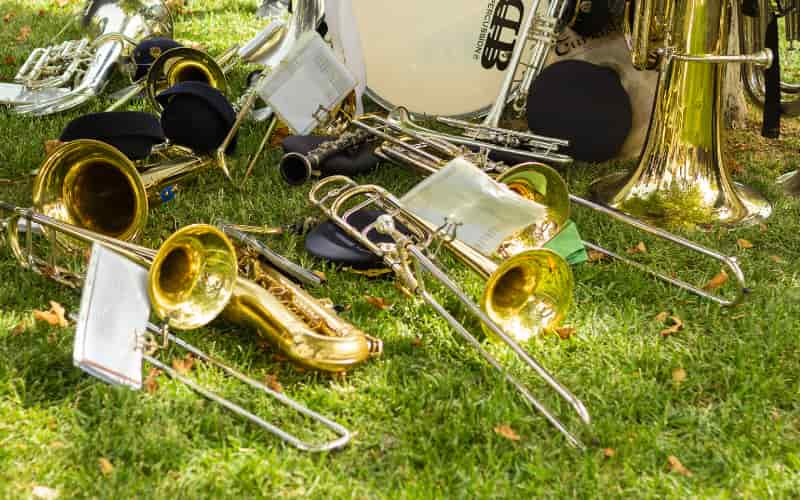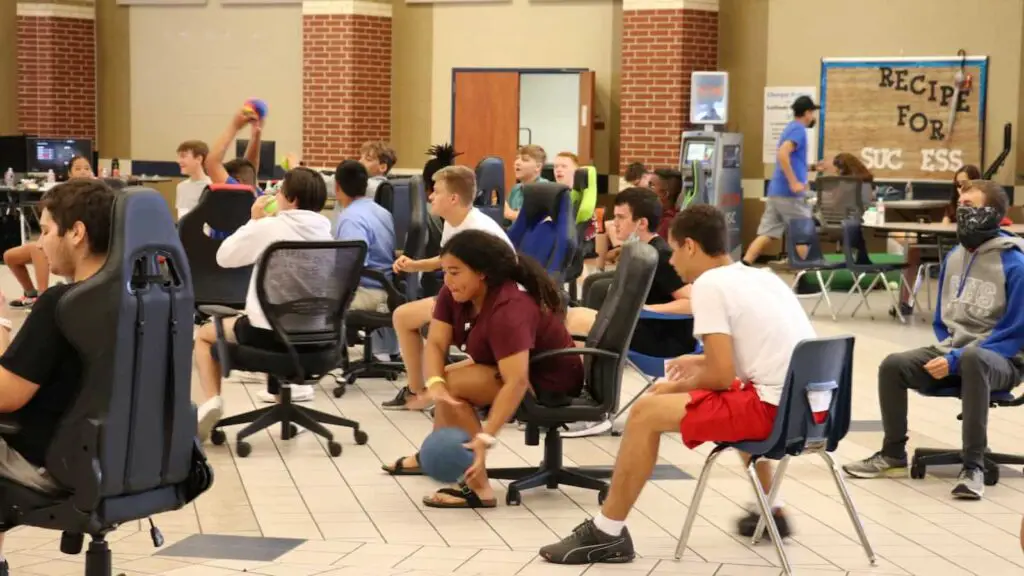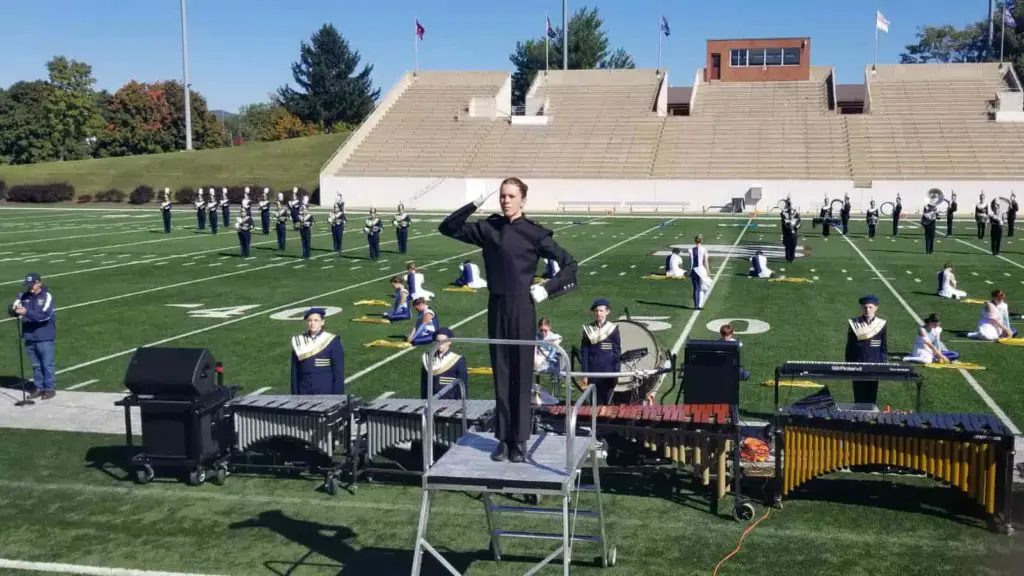For freshmen or upperclassmen who will be starting their first year in the marching band, band camp can feel awkward. They don’t know anyone, and it can be difficult to integrate them into the band and make them feel welcome. One way to help students relax, have fun, get to know each other, and foster a team mindset is through the use of icebreakers and team-building games.

ICEBREAKERS For Band Camp
No matter how large or small the marching band might be, it can be challenging to learn and remember someone’s name right away.
Band members may be shy and less open to approaching someone and starting a conversation naturally. Many freshmen have never experienced marching band and arrive at camp where they might not know anyone from the middle school band.
That can be an uncomfortable feeling and to help new members learn the names of the existing band members and open up a bit, playing icebreaker games is a great way to start band camp.
You can find many icebreaker games online, but here are some of our favorite ones and how to play them!

Jump In, Jump Out
Jump In, Jump Out is a classic marching band activity that students can do on the first day of camp and when meeting the bands from the visiting team’s school.
This game doesn’t require much space and is perfect for the side of the field/track and in the band room.
How to Play:
To play this game, have everyone gather in a circle and have the students sing “Jump in, jump out, introduce yourself” to start the game.
Note: We recommend a senior, junior, or leadership member be the first to show new members what to do and how the game will work.
Everyone in the circle will say/chant/sing, “Jump in, jump out, introduce yourself,” and one student will jump into the center of the ring and say their name, section, and a fun fact about themselves.
After a student says their name, everyone will respond by saying “yeah” after each time the person in the center makes a statement. When they are done, they jump back into the circle, and the game begins again.
Below is an example of how to play this game with cheerleaders instead of marching band members.
Yes! Name Game
The Yes! Name Game is a classic summer camp introduction and name-learning game that works well for band camp.
How to Play:
One person or the leader (ex: drum major) will say their name and motion at the same time. Everyone must say Yes and repeat the person’s name and motion, followed by Yes!
It is a straightforward game; even shy individuals can join in because the motion can just be waving, putting an arm out in front of them, jazz hands, etc.
Picking someone confident and a little dramatic who is not a new band member is excellent to start with because they will be comfortable making a random motion that will make others laugh.
Below is an example of how to play the Yes! Name Game. The presenter introduced two ways to play in this clip by using names or locations. The first round can be names at band camp, and depending on the band’s size, a second round can be played using locations. This exercise is suitable for small and medium-sized marching bands (15 – 40 members).
Name Wave
This game is similar to the Yes! Name Game. You can either have the entire band stand in a circle or divide the band into several smaller groups if your band is large.
How to Play
Like the Yes! Name Game, each person in the circle will say their name and make a motion with their body. Everyone else in the circle must go one by one and say that person’s name, and do their motion.
This game is a great way to remember names and have a little fun at the same time. Check out the example below:
Do any of these three icebreaker name games at the start of the first day of camp before heading outside to learn fundamentals.
You should notice at lunchtime the new members of the band sitting and talking with their section or people from other sections whose names they learned with the icebreaker games.
Remember, there will always be shy members of the band, and you should explain these games in a way that makes them low-pressure and sound fun. There are so many name icebreaker games, but these three are ones best suited for high school marching band members.
TEAM-BUILDING GAMES for Band Camp
Band camp can be exhausting and can get boring, repeating the same commands and exercises every day of camp.
Team-building games can keep the members of the marching band engaged and let them have some fun. There are hundreds of team-building games that you can find online.
The size of the band, space available, and time that can be put aside to play these games should guide your decision for what to play.
Not all team-building games have to involve an entire team completing an exercise together. Band camp is not a corporate retreat where coworkers will be doing trust falls or three-legged races.

The students are still children, and these team-building games can simply be playing games together and having fun. While some team-building games seem too “childish” for high school students attending band camp, the games’ simplicity leads to fun and bonding. These are some of our favorite band camp team-building games.
Four Corners
Yes, the classic elementary school game Four Corners is a great team-building game for band camp. While it may sound childish, you will be surprised at how competitive the band members will get and how much fun they end up having.
How to Play
If you are unfamiliar with how to play Four Corners, give each corner of the room, you are in a number 1-4. A timer should be set for a minute; while counting down, the students must pick a corner to stand in when the alarm sounds.
Someone must either sit on the floor or in a chair with their eyes closed and call out a corner, for example, “Corner Number 4,” and open their eyes and look at the corner.
Whoever is standing in the chosen corner is out and must sit down until the game starts again. Once again, the timer is set, and the students run (or power walk) to a different corner and so on until there is one person left.
Here’s a fun video on a family game of 4 corners that can help you visualize how to play.
Variations for Band Camp
This game has many variations; for band camp, assigning a word to a corner is fun.
For example:
the guesser can say something like,
“Corner 1 is pizza; corner 2 is hotdogs; corner 3 is hamburgers; corner 4 is sandwiches.”
After announcing which corner is which, the person who will be the guesser will say something like, “What is your favorite type of picnic food.”
The students must get into the corner that best matches their favorite type of picnic food, and the game continues with different topics.
Note: Since the people playing are high school students, some rules must be established to avoid arguments and injury.
The director or drum major organizing the game should make it clear that each student must choose a corner to stand in by the time the timer ends.
Students can’t stand in the space between two corners, and once the timer rings, they cannot leave the corner until the next round. Also, state clearly if the students must walk or power walk only and that they cannot run.
The purpose and benefit of playing Four Corners is that the students will have to stand in a corner with people until the next round.
When using topics instead of numbers, the students will move to the corner they choose, which is full of other students who like the same thing. This allows students to identify the people in the band with similar interests and can be a subject to talk about and bond over during lunch, water breaks, or at the end of the day.

Duck, Duck, Goose
Duck, duck, goose is like four corners, something the students know how to play, haven’t played in several years or since elementary school, and can create a fun and light-hearted environment.
If the band is small, you can play this game outside on the field or if your band is large, break the band into smaller circles that can play all at the same time.
While some elementary students take duck, duck, goose seriously and want to win, high school students are not going to be upset if they are unable to reach the empty spot before the goose catches them.
The students are faster, more competitive, and will play the game as if it was a life or death situation.
The game uses the aspect of competition to encourage students to play; there is no real winner or loser. The kids will have fun running around and reliving their elementary school days a bit and will become familiar with band members simultaneously.
Duck, duck, goose is a good option for a team-building game to play either on the middle or final day of band camp, where the students will be more comfortable with each other.
Note: The game does not have to go on forever and is quick enough to play in 15 minutes if the band is broken into smaller groups.
You should expect to hear a lot of laughs with this game, and the students won’t think it is too immature for them once they start playing.

The Human Knot
This game is a lot of fun and is a fun way to develop communication and cooperation among students.
The human knot game works best by establishing a group of 5 to 10 students. While you can play the human knot with an entire band, breaking the band up into sections or random groups helps to prevent injury and fighting.
For this game, you can give each group a time limit in which the task must be completed or played without any time limits.
How to Play
Everyone must stand in a circle and extend their right hand into the center of the circle. Instruct the team to grab hold of someone’s hand who is across from them, not directly to their right or left.
Once all the students have joined their right hands, instruct the same for the left hand. What results is a tangle of arms in the center of the circle.
The players must untangle their arms and create a single unbroken circle. The only rule is that players must continue to hold hands at all times in the game.
The students will have to work together to assess the tangle of arms before them and determine how to untangle themselves best while still holding hands. To avoid injury, the students should move one by one and slowly work to untangle themselves.
The more confident or assertive students will start giving instructions, but the group must work together as a unit to untangle their arms.
Every person in the group will have to work together to untangle themselves. Everyone’s arms are scrambled up, so the students must twist and turn or crawl over and under others’ arms to form a single circle. This encourages other students to make suggestions and speak out to explain their ideas. This exercise is also a great way to promote critical thinking and creative problem-solving.
The human knot game usually leads to lots of laughter and people trying new and/or challenging things for the game to continue. Check out the video below to see how to play the human knot game.
Drum Major Says
This is a fun spin on the childhood game of Simon Says. Instead of “Simon says…” the Drum Major will stand on a podium and say “Drum Major says…” before having the members do an action.
Drum Major Says can be played like a typical game of Simon Says or incorporate stationary commands if appropriate. Like Four Corners and Duck, Duck, Goose, the band members will take this game very seriously.
This game is good to play at band camp because it requires students to listen to the Drum Major and focus on them when they speak.
Keeping your eyes on the Drum Major when performing is an essential part of marching band. The Drum Major sets the tempo, gives cues, and also helps keep the band in order and focused.

Drum Major Says is a light-hearted way to still work on listening to commands but in a relaxed setting where it is clear that the shouting and commands are part of the game, not because someone is doing something bad or someone in leadership is angry at them.
Note: Learn more about how important Drum Majors are to Marching Band by reading this article. What Do Drum Majors Do? (Tough Job Description)
Don’t Laugh
This game has many different names, like Statue, Museum, etc.
How to Play
1. Arrange the students into a block with enough space between and around each student.
2. The Drum Major or an adult on staff should call the band to an attention position.
3. While the students stand in attention position, explain to the group that they must stand in attention position with neutral faces for the entire game.
4. Then selected students or the Drum Major/leadership members will walk around the students and try to make them laugh. The students can not touch the person in the attention position, but they can say, move, or do something to make them laugh.
5. Once they laugh, they are either out, or they too can join the students trying to make the other students break down laughing.
Of all the team-building games, this one may seem like it does not have a purpose, but it is not true. In marching band, keeping a focused neutral/serious expression when entering the stadium, field, or performance space is encouraged. Learning to block out distractions is critical to a cohesive band performance. Don’t Laugh is silly, but it is a way to condition students to block out and not react to distracting things around them.

Why Play Games At Band Camp?
It may sound counterproductive to be playing games while at band camp when the entire purpose of band camp is to learn how to march, learn music, and start working on the drill for the year’s show.
It is important to break up the seriousness and demanding aspects of band camp by playing a quick little game before lunch or before camp ends for the day to let the students bond.
The kids will bond over being in a band together, but if the students aren’t able to connect on a deeper level, their shared desire for a good performance doesn’t fully develop.
You often hear that the marching band isn’t just a musical ensemble but a family instead.
The students will spend hours after school at practice, Friday nights at games, and even all day on Saturdays for competitions together.
If the students do not feel like they are accepted or can develop friendships with other band members, they will not want to show up or put in any effort at practice or games.
These team-building games at band camp help leadership members become good and strong leaders.
Being a leader is more than just barking commands and demanding excellence at all times. A good leader is respected by their peers, respects the people they lead, encourages a group, is serious, and is the biggest cheerleader of the band as a whole and for each student at the same time.
Being able to relate to the other members of the band and establish when it is time to work hard and when it is time to have fun starts at band camp. Marching band is a fun activity, not a mandatory prison sentence. It is okay to be silly and laugh. It is okay to be a kid.
Having fun while encouraging skills like communication, creative thinking, focus, strategizing, healthy competition, and motivation, in a judgment-free and safe environment is why doing these icebreakers and team-building games during band camp can start the year off on the best (left) foot.
We hope this article has been helpful and informative for you in your musical journey. Please let us know if there is anything that we could add or change to make this article a better resource for our readers.
Please e-mail us at: [email protected] to let us know how we are doing!
Disclaimer: This post may contain affiliate links. We only recommend high-quality products that are used and recommended by real musicians. If you use these links to buy something we earn a small commission.
